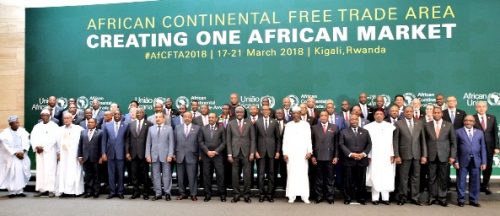The Council of Minister of Ethiopia today approves the African Continental Free Trade Agreement (AfCFTA), which envisages creating the largest common market in the world.
“The decision is consistent with PM Abiy’s vision of creating a closer & full regional integration —where minds are open to ideas & markets are open to trade. Ethiopia’s decision & track record of advocating Pan African causes will bring to reality an integrated Africa,”the Office of the Prime Minister twitted , describing the AfCFTA as one of the biggest trade agreement since the creation of the WTO.
The bill now referred to the national parliament is expected to be approved in the coming weeks. Spearhead by the African Union Commission, the AfCFTA was signed 44 member state of the Union in Kigali last March.
For the agreement to go fully operational, at least half of the total signatories have to approve by their respective national parliaments before March 2019.
So far about a dozen countries including Kenya, Rwanda and Ghana have passed the bill I their national legislative bodies. In addition the total number of signatory countries of the protocol has also reached around 50.
Benefits
The AfCFTA aims to create a single continental market for goods and services, with free movement of business persons and investments, and paving the way for accelerating the establishment of the Customs Union.
Currently 16 of the 55 African countries are landlocked, relying to some degree on their coastal neighbours for extra-African trade and development using ports and shipping lines. Reports show that trade among the landlocked countries and their neighbors has been low.
“Implementation of the AfCFTA creates opportunities for intra-African market access, and can significantly increase trade flows. Tariff removal and cost reduction under the free trade arrangement also reduce production costs and induce economies of scale,” says Africa Trade Report 2018 by the Africa export-import bank.
“That spurs higher domestic production and investment into different sectors of the economy. And that, in turn, enhances growth in exports across sectors and boosts value addition in production and exports, further deepening intra-industry trade across the continent,” the report explains.
When fully goes operational the AfCFTA targets to bring together fifty-four African countries with a combined population of more than one billion people and a combined gross domestic product of more than $3.4 trillion.
With with concrete targets the AfCFTA also targets to double intra-African trade flows from January 2012 and January 2022, according to the promoter of the continental free trade area – the Africa Union Commission.
Currently the share of intra-Africa trade represents 15% of the total trade of the continent. While 67% of Europe’s trade is with itself . The figure for Asia and North America is 58% and 48% respectively.

